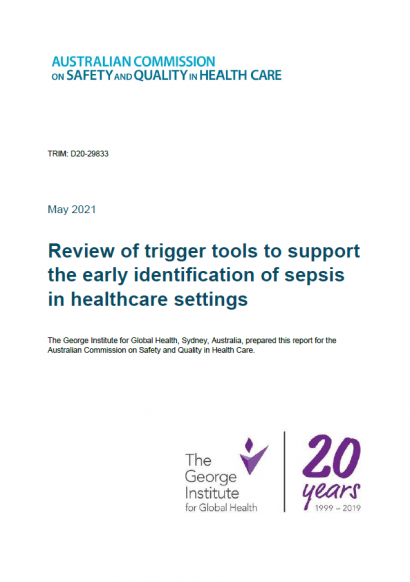Infection Prevention and Control (IPC) Week is held during the third week of October each year to highlight the importance of preventing infections. The theme for IPC Week 2024 is ‘Move the needle on IPC by breaking the chain of infection!’.
Quality statement 5
A patient treated for anaphylaxis remains under clinical observation for at least four hours after their last dose of adrenaline, or overnight as appropriate according to the Australasian Society of Clinical Immunology and Allergy Acute Management of Anaphylaxis guidelines. Observation timeframes are determined based on assessment and risk appraisal after initial treatment.
Quality statement 2
A patient with anaphylaxis, or suspected anaphylaxis, is administered adrenaline intramuscularly without delay, before any other treatment including asthma medicines. Corticosteroids and antihistamines are not first-line treatments for anaphylaxis.
Quality statement 1
A patient with acute-onset clinical deterioration with signs or symptoms of an allergic response is rapidly assessed for anaphylaxis, especially in the presence of an allergic trigger or a history of allergy.
The Acute Anaphylaxis Clinical Care Standard contains six quality statements describing the key components of care to improve the recognition of anaphylaxis, and the provision of appropriate treatment and follow-up care.
Information for health service organisations to guide practice and monitor improvement using the clinical care standard, and resources to support implementation.
Guidance for clinicians on the six evidence-based quality statements from the clinical care standard, as well as helpful resources.
Information for health service organisations to guide practice and monitor improvement using the clinical care standard, and resources to support implementation.
This standard describes the care you should expect to receive if you are at risk of, or experience delirium. Find out more about what the standard says for consumers.
Information about the Delirium Clinical Care Standard for clinicians
Quality statement 4
A patient with cognitive impairment on presentation to hospital, or who has an acute change in behaviour or cognitive function during a hospital stay, is promptly assessed using a validated tool by a clinician trained to assess delirium. The patient and their family or carer are asked about any recent changes in the patient’s behaviour or thinking.
A diagnosis of delirium is determined and documented by a clinician working within their scope of practice.
Quality statement 2
A patient at risk of delirium is offered a set of interventions to prevent delirium and is regularly monitored for changes in behaviour, cognition and physical condition. Appropriate interventions are determined before a planned admission or on admission to hospital, in discussion with the patient and their family or carer.
The Safety and Quality Advice Centre (the Advice Centre) provides support to health service organisations, assessors and accrediting agencies on the implementation of Safety and Quality Standards and accreditation assessment requirements under the Australian Health Service Safety and Quality (AHSSQA) Scheme.
The Commission undertakes projects and programs to support the safe and quality use of medicines. This includes national guiding principles and national indicators for QUM in Australian hospitals.
From 1 January 2023, the Commission became the custodian of a range of QUM functions, expanding our role in QUM stewardship. For more information about these QUM functions please visit the QUM Transition page.
The Multi-Purpose Services Aged Care Module is designed to support eligible Multi-Purpose Services to improve aged care delivery. With a focus on quality and compliance, it's designed to simplify meeting NSQHS Standards while improving resident outcomes.
Missed a recent webinar? Want to review the content from a past session? Check out the Program Series Webinar archives for recordings of past events. Access to the archives is free and a great way to review session tips or check out webinars that you have missed.
The National Safety and Quality Digital Mental Health Standards aim to improve the quality of digital mental health service provision, and to protect service users and their support people from harm.
The Commission is working in partnership with The George Institute for Global Health and Sepsis Australia to extend the National Sepsis Program. This program aims to improve the awareness, recognition and support for people at risk of or diagnosed with sepsis in Australia.
To support implementation of the NSQHS Standards, the Australian Commission on Safety and Quality in Health Care provides guidance for the submission of applications, registrations, requests for extensions and notifications of risk.

